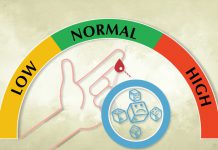A disturbed circadian rhythm can spike your blood sugar levels! One may wonder how is it possible that lack of shut-eye can lead to a serious metabolism disorder, Diabetes mellitus; a condition no longer observed in the elderly alone. Recent studies show that sleep deficit aggravates risk of Type 1 diabetes which afflicts mainly the pediatric population; along with Type 2 diabetes, one of the leading causes of blindness among the working age folks, that has gripped even the younger generation of adolescents and youth now, who are unaware of it due to lack of visible symptoms at its onset.
Connection between Sleep and Diabetes
In diabetes mellitus, there is either lack of Insulin, a hormone which keeps blood glucose levels normal, due to failure of its production from pancreas (Type 1 Diabetes), or ineffective utilisation of insulin produced due to development of insulin resistance, causing failure to respond towards its normal function of supplying glucose to body cells (Type 2 Diabetes). Either way, diabetes results due to body’s inefficiency to break down glucose that is blood sugar which starves our body cells for energy leading to high unutilized blood sugar levels.
Slow-wave sleep (SWS) or deep sleep is a crucial stage of sleep associated with memory consolidation and recovery upon sleep deprivation. Studies have shown that if one doesn’t get enough sleep of 6-8 hours along with a greater decline in SWS, sympathetic nervous system (body’s stress control center) and hormone balances get altered affecting overall glucose regulation. Sleeplessness increases the body’s need for insulin to maintain the blood glucose levels and also affects the normal working of insulin-producing cells, thereby putting one at a high risk of diabetes. Lack of sleep makes one fatigued, which jolts the sympathetic nervous system in high gear, thus impeding its ability to regulate blood sugar levels. Even sleeping four hours or less for just two nights can temporarily disrupt the normal blood sugar regulation.
The less one sleeps, chances are more that such sleep deprived individuals tend to overeat due to production of extra ghrelin (appetite stimulating hormone) and there is simultaneous lowering in the production of leptin (satiety hormone). Obesity results due to cravings for high-calorie foods and unhealthy high-carbs for a quick energy boost with late night snacks, coffees, etc. causing blood sugar malfunction as overweight individuals have excess fat that inhibits proper insulin function. Also, individuals with prior family history of diabetes are at a higher risk of developing the same, if they regularly miss out on a good night’s rest.
Get ample sleep to avoid Diabetes
Being a nocturnal and workaholic has created an illusion in today’s generation pertaining to enhancing work productivity and perking up bank balances. At odds with the popular belief, eight hours is not always the gold standard of ideal sleep, therefore one can lower the risk of impending diabetes by figuring out the ideal amount of shut-eye required. Be it a baby or an adult in their 30s, according to their age and fitness levels, sufficient amount of sleep is required wherein kids and teens need more sleep than adults. A good marker that you’re getting enough sleep is when you feel rested upon waking up regardless of the hours asleep, whereas a sluggish feeling during the day, points out a lack of good slumber. Extra sleep can be squeezed in by napping for not more than 30-40 minutes, but must be at least six hours prior bedtime, or else it’ll be difficult to fall asleep in night.
Fortunately, the sleep-diabetes connection is reversible as our body can recover from short periods of sleep deprivation if bedtime is moved forward even by as less as 15 minutes, gradually increasing each night. Prolonged chronic sleep deficit is interpreted as a constant stressor for the body, fueling the risk for diabetes. Best avoidance stratagem against this sugar disease will be achieved by adhering to the normal sleep-wake cycle by exercising regularly to boost metabolism and following a timely intake of healthy diet; in short let your body cycle run on time!
You may visit Thyrocare.com to check offers on Aarogyam packages.










